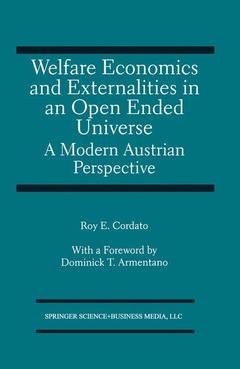Description
Welfare Economics and Externalities In An Open Ended Universe, Softcover reprint of the original 1st ed. 1992
A Modern Austrian Perspective
Author: Cordato R.
Language: English
Subjects for Welfare Economics and Externalities In An Open Ended...:
Keywords
Aging; Institution; Policy; Welfare; economy; welfare economics
Publication date: 11-2012
140 p. · 15.2x22.9 cm · Paperback
140 p. · 15.2x22.9 cm · Paperback
Description
/li>Contents
/li>
Along with the renewed interest in the Austrian school of economics over the last two decades, important advances have been made in applying its princples to concrete issues that typically face market economics. However, very little has been done in the area of externalities and the concept of social efficiency.
The overarching purpose of this book is to establish a sound theoretical basis for further empirical and public policy analysis in the area of externalities. In order to do this, a general theory of welfare economics is required. The author offers an alternative to the conventional neoclassical welfare paradigm -- his construct does not include perfect competition or general equilibrium.
After the author develops his theory of welfare economics, he interprets externalities in light of the theory and discusses policy remedies and directions for further research.
The overarching purpose of this book is to establish a sound theoretical basis for further empirical and public policy analysis in the area of externalities. In order to do this, a general theory of welfare economics is required. The author offers an alternative to the conventional neoclassical welfare paradigm -- his construct does not include perfect competition or general equilibrium.
After the author develops his theory of welfare economics, he interprets externalities in light of the theory and discusses policy remedies and directions for further research.
Foreword. Preface. Introduction. Neoclassical Externalities Theory. The Austrian Critique. Outline and Organizational Framework. 1: The Genealogy of the Austrian Position. Mises and Rothbard on Externalities. Hayek on External Benefits and `Collective Goods'. Externalities Analysis and the Early Austrians. Conclusion. 2: Externalities and Modern Austrian Theories of Economic Welfare: Problems and Promises. Rothbard's Criteria of Demonstrated Preference. Kirzner: Efficiency as Plan Coordination. 3: Catallactic Efficiency: Welfare Economics in an Open Ended World. Catallaxy and Economy. Catallactic Efficiency. Ideal Institutional Setting vs. Ideal Market Outcomes. The Meaning and Causes of Inefficiency. Conclusion: Catallactic Efficiency, Kirzner's Coordination Standard and Entrepreneurship. 4: Catallactic Efficiency and Externalities. Externalities and Social Efficiency. Kirzner's IIS: The Thread That Binds. 5: Application, The Economics of Tort Liability. Coase and Modern Law and Economics. Subjective Value, Information, and Time: The Austrian Critique. Catallactic Efficiency and the Economics of Tort Law. Conclusion: Problems and Considerations for Further Analysis. Conclusion. Unresolved Issues. Final Remarks. References. Index.
© 2024 LAVOISIER S.A.S.
These books may interest you

The Economics of Welfare 209.69 €



